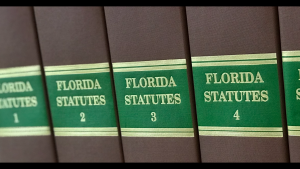
What is a Florida DUI?
To prove the crime of DUI in Tampa, the prosecutor must prove two things beyond a reasonable doubt:
First, the defendant drove, or was in actual physical control, of a motor vehicle.
Second, one of the following two things was true. The defendant, while driving or in actual physical control of a motor vehicle, was under the influence of alcohol or another substance to the extent that his or her normal faculties were impaired, or, the defendant had a blood alcohol level or breath alcohol level of .08 or more.
Based on the prior criminal history of the defendant or the facts of the case, a Florida DUI can be charged as a misdemeanor or a felony.
Is a DUI in Florida a Felony?
For most first and second DUIs, a DUI is not a felony in Florida. However, depending on the defendant’s criminal history, a Florida DUI can be charged as either a misdemeanor or a felony. Only Florida circuit courts handle felony DUI charges. We cover the 4 situations in which a Florida DUI can be charged a felony later on in the “When is a Florida DUI a Felony” section.
When is a Tampa Florida DUI a Misdemeanor?
In most cases, a first or second Tampa DUI will be charged as a misdemeanor. A Florida misdemeanor is a criminal charge whose maximum penalty is less than one year in jail. Florida misdemeanor cases are handled in the county court. A first or second DUI can be charged as a felony if during the course of the DUI, a person other than the driver is killed or suffers serious bodily injury.
First Florida DUI
A person convicted of a Florida DUI for the first time faces a maximum of 6 months in jail. However, if the person’s blood alcohol level was .15 or higher, or there was a minor in the vehicle, the maximum jail sentence is 9 months. Typically, however, people that are convicted of a first time DUI in Tampa, Florida are not sentenced to jail. Rather, they are sentenced to serve between 6 and 12 months of probation.
Second Florida DUI
A person convicted of a second Florida DUI (which took place within five years of a prior DUI) faces a minimum mandatory sentence of 10 days in jail and a maximum of nine months in jail. However, if the person’s blood alcohol level was .15 or higher, or there was a minor in the vehicle, the maximum jail sentence is 12 months in jail. It’s important to know that in lieu of the minimum mandatory 10-day jail sentence, Florida law permits a judge to sentence a person to spend 10 days at a residential alcohol abuse treatment program or a residential drug abuse treatment program. There are two benefits to this law. First, the person can get help for a drug or alcohol problem; second, the person can avoid having to serve 10 days in jail. Though residential alcohol or drug treatment can be tough, it’s better than jail.
A person convicted of a second Florida DUI (which took place outside five years of a prior DUI conviction) faces a maximum of 9 months in jail. However if the person’s blood alcohol level was .15 or higher or there was a minor in the vehicle, the maximum jail sentence is 12 months.
Third Florida DUI (Outside 10 years of a Prior DUI)
A person convicted of a third Florida DUI 10 years after a prior DUI faces a maximum of 12 months in jail.
When is a Florida DUI a Felony?
A felony is a criminal charge that can be punished by a year or more in prison. A Florida third-degree felony is punishable by a maximum of 5 years in prison; a Florida second-degree felony is punishable by a maximum of 15 years in prison; a Florida first-degree felony can be punished by a maximum of 30 years in prison.

While misdemeanor Florida DUI cases are handled in the Florida county court, felony DUI cases are handled in the Florida circuit court. There are 4 situations in which a Tampa, Florida DUI can be charged as a felony. First, if a guilty plea or guilty verdict would make a defendant’s current DUI his or her third DUI conviction, and one of the prior DUI convictions took place within 10 years of the defendant’s current DUI arrest. Second, if a plea or guilty verdict would make a defendant’s current DUI his or her fourth DUI in his or her lifetime. Third, if the DUI with which the defendant is charged caused a person other than the driver serious bodily injury. Fourth, if the DUI with which the defendant is charged caused the death of a person.
Florida Third DUI (within 10 years of a prior DUI conviction)
If a person is convicted of a third DUI within 10 years of a prior DUI, Florida law requires that the judge adjudicate the person guilty of a third-degree felony. Additionally, a person convicted of a third DUI (which took place within 10 years of a prior DUI conviction) faces a minimum of 30 days in jail.
It’s important to know that in lieu of the 30-day jail sentence, Florida law permits a judge to sentence the person to 30 days at a residential alcohol abuse treatment program or a residential drug abuse treatment program. There are two benefits to this law. First, the person can get help for a drug or alcohol problem; second, the person can avoid having to spend time 30 days jail. Though residential alcohol or drug treatment can be tough, it’s better than jail.
Fourth Florida DUI
If a person is convicted of a fourth DUI, Florida law requires that the judge adjudicate the person guilty of a third-degree felony.
Florida DUI – Serious Bodily Injury
According to Florida law, a DUI that causes serious bodily injury is defined as an injury that creates a substantial risk of death, serious personal disfigurement, or protracted loss or impairment of the function of any bodily member or organ.
If a person is convicted of a DUI that caused a person (except the driver) a serious bodily injury, Florida law requires that the judge adjudicate the person guilty of a third-degree felony. Also, even if the driver has no prior criminal record unless the judge finds there is a valid reason for a sentencing departure, the judge is required to impose a prison sentence of around 51 months.
Florida DUI Manslaughter

When a DUI driver causes the death of another person, the offense of DUI manslaughter is committed. Florida DUI manslaughter is a second-degree felony, punishable by a maximum of 15 years in prison. According to Florida sentencing law, unless the judge finds a valid reason to depart, the judge must sentence the person to just over ten years of prison. Even if the judge wants to, she cannot sentence the defendant to less than 4 years in prison.
If the driver commits DUI manslaughter, and he or she knew or should have known a crash had occurred and then does not try to help the injured person, then the DUI offense becomes a first-degree felony, punishable by a maximum of 30 years in prison.
Are you looking for the best DUI lawyer in Tampa Florida? Contact Attorney David C. Hardy
Tampa Attorney David C. Hardy is a former DUI prosecutor that now represents persons accused of DUI. He is Board Certified by the Florida Bar and the National Board of Trial Advocacy as an Expert in Criminal Trial Law. As a prosecutor and defense attorney, he has extensive experience handling DUI cases. Contact him today for help with your DUI case.
Posted in Florida Criminal Defense, Florida DUI Defense
